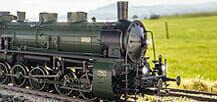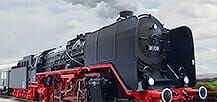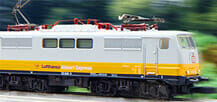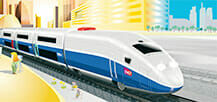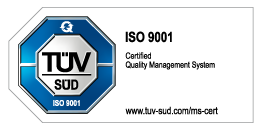Class 248 Dual Power Locomotive
Prototype: Railsytems RP, Inc. class 248 dual power locomotive (Vectron Dual Mode). From the Vectron product family from Siemens. Road number 248 002. The locomotive looks as it did in 2021.
Most Important Facts
Sound demo| Article No. | 39291 |
|---|---|
| Gauge / Design type | H0 / 1:87 |
| Era | VI |
| Kind | Electric Locomotives |
Check with your local dealer Find Dealer
Highlights
- Completely new tooling.
- Buffer height adheres to the NEM.
- Frame and body constructed mostly of metal.
- Numerous separately applied details.
- Cab lighting can be controlled digitally.
- Engine room lighting can be controlled digitally.
- mfx+ digital decoder and extensive sound functions included.
-
Product description
Model: The locomotive has an mfx+ digital decoder and extensive sound functions. The locomotive has controlled high-efficiency propulsion. 4 axles powered. Traction tires. The triple headlights and dual red marker lights change over with the direction of travel, will work in conventional operation, and can be controlled digitally. The headlights at Locomotive End 2 and 1 can be turned off separately in digital operation. When the headlights are off at both ends, then the double "A" light function is on at both ends. The cab lighting changes with the direction of travel and can be controlled digitally. Long-distance headlights can be controlled separately in digital operation. Maintenance-free warm white and red LEDs are used for the lighting. Brake hoses are included, which can be mounted on the locomotive.
Length over the buffers approximately 23 cm / 9-1/16".This model can be found in a DC version in the Trix H0 assortment under item number 25291.
Find more Märklin explanation videos on our YouTube Channel
Spare parts for our articles can be found here in our spare parts search.
-
Publications
- New items brochure 2023 - Product programme 2023/2024
-
Prototype information
Currently, almost 90% of the rail service is done under catenary on the German rail network. However, in the next few years there will also be main lines on which diesel powered units will be underway, because only around 60% of the lines are electrified. So for example, in the Allgäu area or on the line Nürnberg – Hof diesels are still used a lot. It is a declared goal of the Railroad Transportation Company (EVU) and of politicians to minimize CO2 emissions in the next few years. Certain rail lines however are not planned for electrification for a variety of reasons, such as connecting tracks only a few kilometers long for freight service. Here, installation of catenary would not be economically justifiable. The solution is already at hand: The following applies, developing powered units able to run under catenary as well as from diesel pistons. The first tentative attempts did not lead to the desired goal. Bombardier presented a unit with the class 187, which had a diesel motor on board for the "last mile". This only gave the locomotives weak pulling power and merely allowed switching maneuvers without catenary. At Siemens, the engineers were not idle either. The firm was successful with the Vectron, a real achiever, which triggered enthusiasm from one end of the country to the other. Orders have been taken for over 1,000 units. The locomotives are running all over Europe. There is hardly a railroad management, which has not indulged in these technically and visually successful units. A pure diesel variant turned to be a flop unfortunately and production was stopped. Yet there was success in developing this type further for dual operation. For diesel and electric motive power do not have to be irreconcilably opposed to each other. The first prototype, road number 248 001, was presented in 2019. The internal qualities of this hybrid unit did not initially really convince the managers of DB AG. It was much more private railroad firms, which involved themselves more closely with the subject "Vectron Dual Mode". The two experimental and test units, road numbers 248 001 and 002, went to Railsystems RP, Inc. The initially white painted units were given the colorful and pleasing company colors of the firm. The remarkable thing is the incorporation into the numbering system. The locomotives were designated as the class 248, which would actually fit into the system for purely diesel units. Visually, the Vectron Dual Mode differs from its pure electric siblings in a variety of ways. The roof only has one pantograph and the former's height has been increased slightly to the maximum permissible dimension. In addition, here you will find the main relay as well as two surge arresters. A small hump can also be recognized because all of the components for a dual unit need space. In addition, the locomotive has clearly become longer compared to the well-known Vectron. It measures over the buffers 19,980 millimeters / 65 feet 6 inches and is thus a good meter / 39 inches longer. On the one side of the locomotive, you will notice the cooling chamber and the two ventilation grills. The first takes in air for the combustion motor and the second one serves to cool the electrical equipment including the traction motors. The service weight is 90 metric tons. The electrical output is indicated at two megawatts, and the diesel motor puts out 2.4 megawatts. The maximum speed is 160 km/h / 100 mph. Railroads are certainly well underway with the Vectron Dual Mode in line with a sustainable climate policy and the expected increase in transport by rail. People can be excited about how these units will prove themselves in harsh everyday conditions at more than just Railsystems RP, Inc. There, where they are already in use, these hybrid units are running without difficulty. Even the change between electric and diesel operation is running smoothly.
-
Digital Functions
Control Unit Mobile Station Mobile Station 2 Central Station 1/2 Central Station 3/2*
Mobile Station 2**Headlight(s) Electric locomotive op. sounds Diesel locomotive op. sounds Low Pitch Horn Direct control Headlight(s): Cab2 End High Pitch Horn Headlight(s): Cab1 End Sound of squealing brakes off Engineer’s cab lighting Long distance headlights Engine room lighting Blower motors Blower motors Horn Switching maneuver Compressor Letting off Air Sanding Opening cab door Windshield wiper sounds SIFA warning sound Train control warning sound Switching range + switching light Horn Horn Coupler sounds Replenishing diesel fuel Station Announcements Sound of railroad crossing gates closing Sound of railroad crossing gates opening * New features of the Central Station 2 (Part No. 60213, 60214 or 60215) with the software update 4.2
** New features of the Mobile Station 2 (Part No. 60657/66955) with the Software Update 3.55
Warning
ATTENTION: not for children under 15 years
